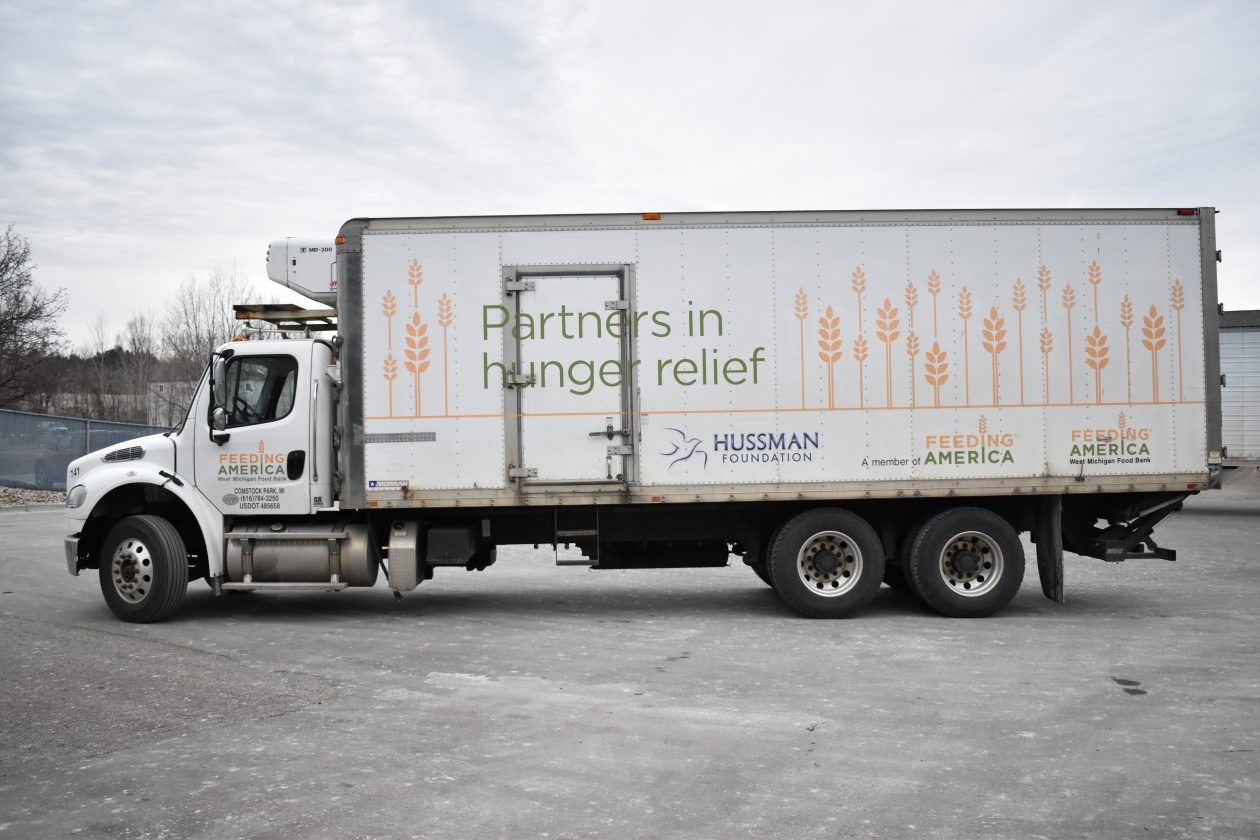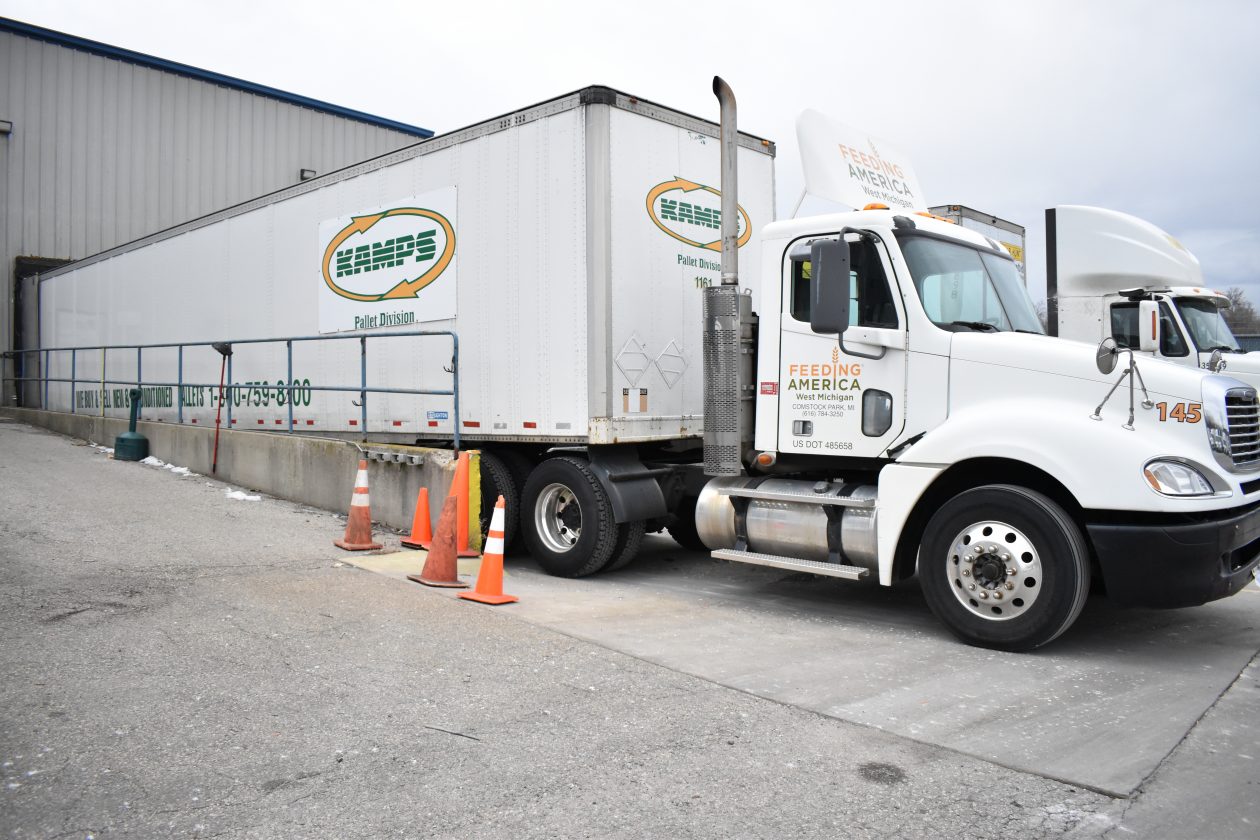The Darden Foundation recently helped fund one of the most important, yet least “glamorous,” aspects of the food bank’s operations – truck fuel. Without trucks, the food bank could not fulfill its mission.

We knew this, but wanted to dig deeper: Why exactly are trucks so essential? What do trucks do all day? How long do they last?
We did some investigating, and learned some facts that may surprise you about the life of a food bank truck.
Early days
TJ, our logistics manager, works with local truck companies to purchase used trucks at low costs. Two used trucks purchased in 2015 with 400,000 miles on them are still running today at 700,000 miles!
Sometimes, trucks are donated by local companies, or if funds allow, the food bank purchases basic trucks that are easy to work with and get the job done.
Serving neighbors in need

The food bank currently owns 30 trucks. These trucks drove 418,000 miles in 2019 – that’s equivalent to traveling almost 17 times around the world!
So many trucks and trips are needed because of the way our organization works. We reclaim safe, surplus food from farmers, manufacturers, distributors and retail stores, and then distribute it to more than 800 partner agencies throughout West Michigan and the Upper Peninsula.
More than 99 percent of the donated food we distribute comes from large-scale food donors (the rest comes from food drives). These donors rarely have time to bring food to us, so our trucks pick up many food donations each day. Almost all of our trucks are refrigerated – called “reefer” trucks – to ensure food safety.
Trucks deliver fresh food directly to neighbors in need through our Mobile Food Pantry program. Neighbors can choose the food they need for their families, as if they are at a farmers market. Typically, more than 100 Mobile Food Pantries are held each month across our 40-county service area.

Trucks also deliver thousands of pounds of various food items to fixed food pantries and other hunger-relief agencies each month – both locally and at “depot delivery” sites in places far from the food bank.
Depot sites are centralized drop-off locations where four to twelve partner agencies visit to receive food orders. Many of these pantries and soup kitchens are small and could not afford transportation to the food bank to pick up orders themselves, so depot delivery sites allow them to put more of their efforts toward serving neighbors in need, instead of driving all the way to one of our warehouses to get food.
Without a well-managed truck fleet – and sufficient fuel – our Mobile Food Pantry program would not be possible and we would struggle to serve all of our other agencies, especially those in the U.P. Smaller pantries and meal sites do not have the capacity to store large quantities of food, and would need to either purchase food at high costs at retail stores or offer neighbors less variety.
The people behind the trucks

Behind all this driving are 16 dedicated truck drivers. Many work upwards of 50 hours a week – sometimes 13 hour days – to ensure food ends up on the plates of our neighbors who need it most. Sometimes, a Mobile Food Pantry is just a 10 minute trip down the road. Other times, it’s an eight-hour drive (on a good day) to Menominee County – 431 miles one way!

Our programs team works with partner agencies like churches and schools to coordinate Mobile Food Pantries. Members of our operations team plan menus based on items available at the food bank while ensuring a variety of food is provided at each Mobile Pantry. The team then fills each truck and sends it on its way.
Meanwhile, our food acquisition team establishes partnerships with retail companies and ensures food donations keep streaming in. Compared to 20 years ago, we are receiving less donated product for a variety of reasons, so now, the team also coordinates the purchase of food for distribution. Whether donated or purchased, much of the food still needs to be picked up and delivered by our trucks.
Maintenance, maintenance, maintenance

Traveling 17 times around the world is not cheap, especially when all that travel isn’t around the world but around West Michigan and the Upper Peninsula where the roads are often covered in snow, ice and salt. In 2019, more than $217,000 went toward truck fuel alone. More than $413,000 went toward maintenance. We are so grateful that the Darden Foundation covered $6,000 of fuel costs.
Truck maintenance is pretty similar to car maintenance but multiplied. A car may only hold a few quarts of oil, whereas trucks hold 10 gallons. And because of how much weight the trucks carry, tires and brakes need to be replaced frequently.
It’s all about the mission

TJ, our logistics manager, has worked at the food bank for nearly 15 years. His logistical planning is what keeps the trucks running.
For him, it’s all about helping people in need:
“I wouldn’t be here if it wasn’t for our mission,” TJ said. He wants to make sure “people are able to have a steady knowledge of where I can get food. We’re there, we’re the rock that people can depend on.”
Truck drivers see the importance of fuel and of maintaining a working truck fleet firsthand. Drivers Casey and Scott point to the number of Mobile Pantry attendees who simply don’t have means of transport to access one of our partner agencies. Just like many of the drivers, Casey and Scott don’t hesitate to step in when needed at Mobile Food Pantries, often helping pass out food and clean up.
Trenton, who coordinates Mobile Food Pantry menus, grew up never missing a meal, but soon after accepting a job at the food bank, he learned that his parents used to attend food pantries before he was born. He loves knowing each day that his work is making a difference in the lives of people like his parents.
Feeding America West Michigan could not serve neighbors to the extent we do without dedicated food bankers who ensure our fleet of trucks stays efficient. Their hard work – and the support of organizations like Darden – means our trucks will continue to bring food to neighbors as long as the need remains.
A special thank you to the food bank staff who contributed to this article in addition to those mentioned: Josh Jannereth, Abby LaLonde, Shay Krick, Ryan VanMaldegen and Sue Zylstra.

